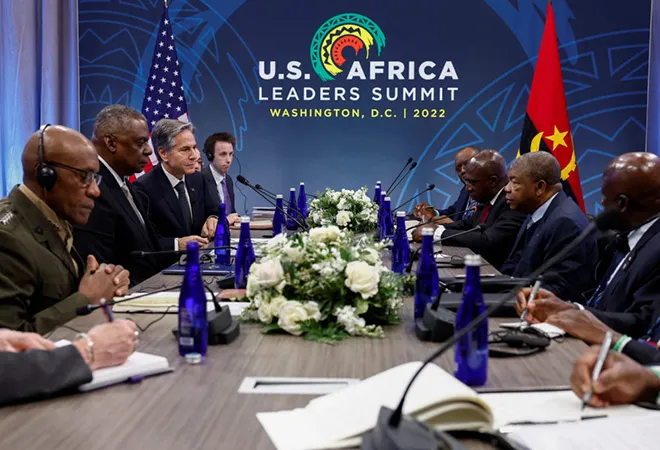
From December 13 to 15, President Biden hosted leaders across the African continent in Washington D.C. for the US-Africa Leaders’ Summit. Reportedly, 49 African governments, the African Union Commission, representatives from civil society and the private sector, young leaders, and the African diaspora in the United States (US) attended the event ning three days. The summit demonstrated the US’ renewed commitment to Africa and provided President Biden’s administration with an opportunity to discuss issues of mutual interest and enhance cooperation on shared global priorities.
However, the twin challenges of the COVID-19 pandemic and the ongoing Russo-Ukrainian conflict now threaten to reverse decades of hard-won macroeconomic, socio-economic, and governance gains on the continent.
The summit was convened at a time when Russia’s war in Ukraine has disrupted Africa’s recovery from the COVID-19 pandemic by exacerbating food and energy insecurities, causing inflation, and massive disruptions in trade and supply chains. Prior to 2020, African countries were some of the
fastest-growing in the world. However, the twin challenges of the COVID-19 pandemic and the ongoing Russo-Ukrainian conflict now threaten to reverse decades of hard-won macroeconomic, socio-economic, and governance gains on the continent.
Acknowledging the need for a renewed partnership
For some time, there has been a
bipartisan consensus among policymakers on the need for the US to renew, revitalise, and prioritise its engagement with Africa. Traditionally, the US engagement in Africa has tended to focus on promoting democratic norms, foreign aid, reducing poverty, and addressing conflict and insecurities. While these priorities are important, they fail to take into account the fast-paced changes occurring across the continent. Today, Africa has emerged as one of the world’s most sought-after destinations for
digital innovation and entrepreneurship. New and emerging technologies associated with the
Fourth Industrial Revolution (4IR) hold both opportunities and risks in critical sectors. However, owing to demographic and relational shifts, the US has lost ground in Africa over the last decade, with declining trade and investment flows.
Another major concern is about the sustainability of US-Africa relations, given the fact that US-Africa summits tend to be rather infrequent. The last summit took place back in 2014. This massive gap of eight years between 2014 and 2022 is regrettable given the fact that Africa’s other development partners like European Union (EU), China, India, Japan, Turkey, the United Arab Emirates (UAE), have all regularly held summit meetings with African counterparts. Unlike in previous years, African countries have today reduced their dependence on western aid. They have diversified their basket of external partners and their leaders and governments are actively voicing their national interests and concerns, and participating in the process of setting the agenda.
Africa has emerged as one of the world’s most sought-after destinations for digital innovation and entrepreneurship. New and emerging technologies associated with the Fourth Industrial Revolution (4IR) hold both opportunities and risks in critical sectors.
Despite these challenges, US diplomacy to Africa has witnessed an upswing in recent months. The launch of a new
US Strategy Toward Sub-Saharan Africa in August, 2022 and the convening of a second US-Africa Leaders Summit is indicative of this change. The new strategy acknowledges Africa’s centrality to the US national interests and the region’s value as an economic partner. It emphasises “African agency” and attempts to downplay perceptions of Africa as an arena for great-power rivalry. Previous attempts by the US to frame its engagement with Africa as exclusively aimed at countering Chinese and Russian influence, as a form of zero-sum competition, have failed to produce dividends or any desired results. Therefore, it is in the US’ interest to redouble its efforts in areas it has a comparative advantage like governance, climate adaptation, just energy transition, and strengthening commercial ties, especially through a deeper focus on trade and investment.
Thus the US-Africa Leaders Summit proved to be an opportunity for President Biden to personally make the case for Washington’s renewed approach towards Africa. It offered a chance to operationalise some of the well-intended commitments the Biden administration has made up to this point.
Outcomes of the summit
The Biden-Harris administration is set to invest at least US
$55 billion in Africa over the next three years, ning across a range of diverse sectors. This is a hefty amount and it is in the US’ interest to follow through with its commitment. To coordinate and oversee these efforts, Ambassador Johnnie Carson, who is the former Assistant Secretary of State for African Affairs, is set to become the new Special Presidential Representative for the US-Africa Leaders Summit implementation.
The new strategy acknowledges Africa’s centrality to the US national interests and the region’s value as an economic partner.
- Establishment of a new diaspora council: The US decided to establish a President’s Advisory Council on African Diaspora engagement in the US. Its task will be to deepen dialogue between the US officials and the African diaspora in the US and advance equity and opportunity for the African diaspora to strengthen economic, cultural, political, and social ties between African communities, the global African diaspora, and the US.
- Support for G20 membership: President Biden during his address before the 77th session of the United Nations General Assembly (UNGA) announced his support for adding African members to the United Nations Security Council (UNSC). It is no secret that, unless African countries have a seat and vote at the decision-making table, it would be difficult, if not impossible, to meet today’s defining challenges and reflect inclusivity and an equitable global order. Although a majority of UNSC’s agenda pertains to Africa and majority of Africans are directly affected by the body’s decisions, the continent does not have a single representing member. Fortunately, at the summit, President Biden reiterated U.S. support in favour of the African Union joining the G20 as a permanent member.
- Supporting African resilience and recovery from COVID-19 pandemic: The US plans to lend up to US$21 billion through the International Monetary Fund (IMF) for low and middle-income countries, many of whom are located in Africa. Various US departments and agencies announced new initiatives and investments to promote two-way trade and investments. For example, the US Trade Representative signed an MoU with the African Continental Free Trade Area (AfCFTA) Secretariat to support institutions to accelerate sustainable economic growth across Africa. Once implemented, the AfCFTA is touted to be the largest free trade area in the world, in terms of number of participating countries, and is set to create a combined continent-wide market of 1.3 billion people and 3.4 trillion GDP.
- The First Regional Multi-Sectoral Millennium Challenge Corporation (MCC) Compacts: The MCC totalling US$504 million were signed with the Governments of Benin and Niger to support regional economic integration, trade, and cross border collaboration. The MCC has signed similar agreements with the Governments of the Gambia, Lesotho, and Malawi for nearly US$675 million which supports climate adaptation.
- Digital Transformation with Africa initiative: President Biden launched this initiative, which aims to expand digital access and literacy across Africa. Under this initiative, the US intends to invest over US$350 million and facilitate over US$450 million in financing for the continent, in line with the African Union’s Digital Transformation Strategy.
- Space collaboration: During the summit, Nigeria and Rwanda became the first African countries to sign the Artemis Accords, which facilitate collaboration and establish principles grounded in the 1967 Outer Space Treaty for safe and responsible exploration and use of outer space.
- Healthcare: The US also plans to invest in Africa’s healthcare workforce to build more resilient health systems. Under the Global Health Worker Initiative, the US intends to invest US$1.3 billion annually from 2022–2024 in health workforce in the Africa region, totalling to at least US$4 billion by fiscal year 2025.
- 21st Century Partnership for African Security (21PAS): Under this partnership, the US plans to provide US$100 million to incentivise and bolster African efforts to implement and sustain security sector capacity and forms. This is a three-year pilot programme under which US and African partners and civil society organisations, will look at ways to sync, share, and support solutions to Africa’s security challenges.
The US Trade Representative signed an MoU with the African Continental Free Trade Area (AfCFTA) Secretariat to support institutions to accelerate sustainable economic growth across Africa.
Going forward
Indeed, the US-Africa Leaders summit was convened at a critical juncture when there is a realisation for a much-needed push in US-Africa relations, both in terms of substance and strategic vision. President Biden is yet to visit Africa, but his top diplomat, Secretary Blinken has already visited the continent three times in the last year. Symbolism, through personal visits, matter a great deal to the African countries and its leaders. Following the summit, the first order of business for the US should be to make the conference a regular event, rather than some sort of a sporadic meeting.
It is important to acknowledge that for African countries, both the US and China are important developmental partners, having different levels of relations. In a number of areas, Chinese firms are outperforming the US, like in road and bridge construction, owing to its lower cost structures. But there are areas, where US companies are competitive like healthcare, renewable energy, and financial technology. The US needs to double down on these comparative advantages and co-opt and engage its large and vibrant diaspora, many of whom maintains commercial connections with Africa. The time is now for the US to demonstrate its sustained commitment to Africa and Africans.
The views expressed above belong to the author(s). ORF research and analyses now available on Telegram! Click here to access our curated content — blogs, longforms and interviews.



 From December 13 to 15, President Biden hosted leaders across the African continent in Washington D.C. for the US-Africa Leaders’ Summit. Reportedly, 49 African governments, the African Union Commission, representatives from civil society and the private sector, young leaders, and the African diaspora in the United States (US) attended the event ning three days. The summit demonstrated the US’ renewed commitment to Africa and provided President Biden’s administration with an opportunity to discuss issues of mutual interest and enhance cooperation on shared global priorities.
From December 13 to 15, President Biden hosted leaders across the African continent in Washington D.C. for the US-Africa Leaders’ Summit. Reportedly, 49 African governments, the African Union Commission, representatives from civil society and the private sector, young leaders, and the African diaspora in the United States (US) attended the event ning three days. The summit demonstrated the US’ renewed commitment to Africa and provided President Biden’s administration with an opportunity to discuss issues of mutual interest and enhance cooperation on shared global priorities.
 PREV
PREV


